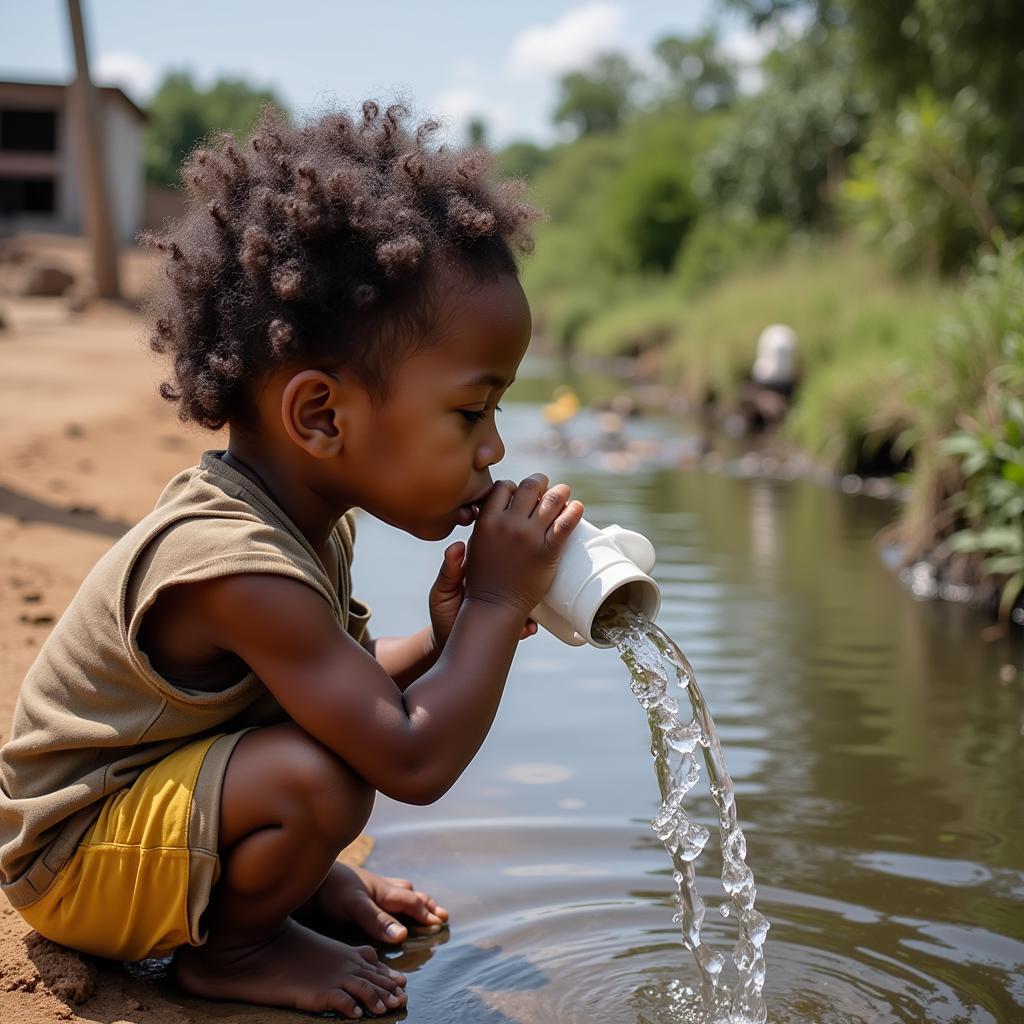Pakistan, a land of vibrant cultures and breathtaking landscapes, is facing a looming crisis that threatens its very existence: water scarcity. This Water Crisis In Pakistan Essay will delve into the complex web of factors contributing to this issue, exploring its devastating consequences and examining potential solutions. It is a crisis demanding immediate and sustained action. We are just at the beginning of understanding the far-reaching implications of water scarcity in this vulnerable region.
Understanding the Depths of the Water Crisis in Pakistan
The water crisis in Pakistan is not a recent phenomenon. Decades of mismanagement, population growth, climate change, and inadequate infrastructure have culminated in a situation where access to clean, safe water is becoming increasingly precarious for millions. The Indus River, the lifeblood of Pakistan’s agricultural heartland, is facing increasing pressure, with dwindling flows and pollution threatening its ability to sustain livelihoods and ecosystems. This issue transcends mere inconvenience; it is a fundamental threat to human security and national stability.
The Role of Climate Change
Climate change is exacerbating the water crisis in Pakistan, bringing erratic rainfall patterns, increased glacial melt, and rising temperatures. These shifts disrupt traditional agricultural practices, strain water resources, and increase the frequency and intensity of droughts and floods. The unpredictable nature of these climatic events makes planning and resource allocation a significant challenge. This uncertainty puts immense pressure on already vulnerable communities.
Population Growth and Urbanization
Pakistan’s rapidly growing population and increasing urbanization are placing immense strain on existing water infrastructure. The demand for water in urban centers is outpacing supply, leading to shortages, rationing, and increased competition for resources. This escalating demand underscores the urgent need for innovative water management strategies and investments in infrastructure.
Mismanagement and Inefficient Practices
Decades of mismanagement and inefficient water use practices have compounded the water crisis in Pakistan. Leakage, outdated irrigation techniques, and a lack of water conservation awareness contribute significantly to water wastage. Addressing these inefficiencies through technological upgrades and public awareness campaigns is crucial for mitigating the crisis. It’s important to shift from a culture of water abundance to one of water conservation.
essay on water crisis in pakistan with outline
What are the Consequences of Water Scarcity?
The consequences of water scarcity in Pakistan are far-reaching and multifaceted. They impact everything from food security and public health to economic stability and social cohesion. The scarcity of water can lead to conflicts over resources, displacement of populations, and increased social unrest.
Impact on Agriculture
Agriculture, the backbone of Pakistan’s economy, is heavily reliant on irrigation. The declining availability of water threatens agricultural productivity, jeopardizing food security and rural livelihoods. As water becomes scarcer, competition for this precious resource intensifies, leading to tensions between different user groups, such as farmers and industrialists.
 Health Impacts of Water Crisis in Pakistan
Health Impacts of Water Crisis in Pakistan
Threats to Public Health
Access to clean drinking water is a fundamental human right. The water crisis in Pakistan puts millions at risk of waterborne diseases, malnutrition, and other health problems. The lack of adequate sanitation further exacerbates these challenges, creating a public health emergency.
Economic Implications
The water crisis poses a significant threat to Pakistan’s economic development. Reduced agricultural output, industrial disruptions, and increased healthcare costs all contribute to economic instability. Investing in water infrastructure and management is not just an environmental imperative; it is also an economic necessity.
Finding Solutions: A Path Towards Water Security
Addressing the water crisis in Pakistan requires a multi-pronged approach involving technological innovation, policy reforms, and public awareness campaigns. From improving water infrastructure and promoting water conservation to exploring alternative water sources and fostering regional cooperation, a holistic strategy is essential.
Dr. Ayesha Khan, a leading hydrologist in Pakistan, emphasizes, “We need to move beyond short-term fixes and embrace long-term sustainable solutions. Investing in water infrastructure, promoting efficient irrigation techniques, and raising public awareness are crucial for securing Pakistan’s water future.”
Mr. Imran Ali, an agricultural expert, adds, “Empowering local communities to manage their water resources effectively is essential. Participatory approaches that involve farmers, local authorities, and NGOs can lead to more sustainable and equitable outcomes.”
Conclusion: Securing Pakistan’s Water Future
The water crisis in Pakistan is a complex and multifaceted challenge that demands immediate and sustained action. From addressing climate change impacts and improving water management practices to investing in infrastructure and fostering public awareness, a collaborative and holistic approach is essential for securing Pakistan’s water future. Ignoring this crisis will have devastating consequences for generations to come. This water crisis in Pakistan essay serves as a call to action, urging stakeholders at all levels to prioritize water security and work towards a sustainable future for all.
FAQ
-
What is the main cause of the water crisis in Pakistan? The combination of climate change, population growth, mismanagement, and outdated infrastructure.
-
How does climate change affect Pakistan’s water resources? It leads to erratic rainfall, increased glacial melt, and higher temperatures, disrupting water availability.
-
What are the consequences of water scarcity in Pakistan? Impacts include reduced agricultural output, threats to public health, and economic instability.
-
What can be done to address the water crisis? Solutions involve improving infrastructure, promoting water conservation, and investing in sustainable water management practices.
-
Why is water conservation important? It helps reduce water waste and ensures sustainable use of available resources.
-
How can individuals contribute to water conservation? Simple steps like fixing leaks, using water-efficient appliances, and being mindful of water usage can make a difference.
-
What is the role of the government in addressing the water crisis? Implementing policies, investing in infrastructure, and raising public awareness are key responsibilities.
For further information, you might also be interested in our essay on water crisis in pakistan with outline and our agriculture in pakistan essay.
Need support? Contact us 24/7:
Phone: +923337849799
Email: news.pakit@gmail.com
Address: Dera Ghazi Khan Rd, Rakhni, Barkhan, Balochistan, Pakistan.